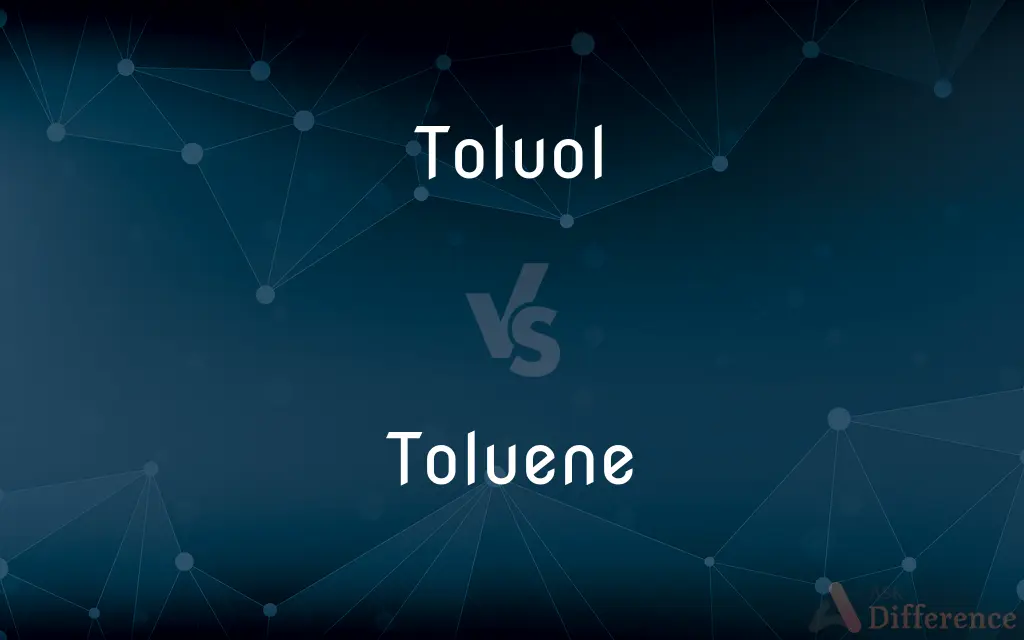Toluol vs. Toluene — What's the Difference?
By Maham Liaqat & Urooj Arif — Updated on May 2, 2024
Toluol and toluene refer to the same chemical compound, C7H8, commonly used as an industrial solvent; "toluene" is the preferred IUPAC name, while "toluol" is an older term.

Difference Between Toluol and Toluene
Table of Contents
ADVERTISEMENT
Key Differences
Toluene is the IUPAC-recommended name for the methylbenzene compound, widely recognized in scientific and industrial contexts. Toluol, on the other hand, is an older name that has largely been phased out in professional settings but may still appear in older literature.
The compound itself, whether referred to as toluene or toluol, is a colorless, water-insoluble liquid with a distinctive smell, used primarily as a solvent and in the production of benzene and xylene. Whereas the term "toluene" aligns with modern naming conventions in chemistry, ensuring consistency and clarity in global communications.
In terms of usage, "toluene" is preferred in academic, scientific, and industrial documents to avoid confusion and maintain uniformity in chemical nomenclature. On the other hand, "toluol" might be encountered in historical texts or during translations of older documents where it was originally used.
Regarding safety and handling, both terms refer to the same chemical which requires careful handling due to its toxic and flammable nature. Whether labeled as toluene or toluol, the safety protocols do not change.
Finally, when procuring or disposing of this chemical, the label "toluene" is what one would expect to find in modern contexts, including safety datasheets and product labels. In contrast, encountering "toluol" in such contexts would be uncommon and indicative of outdated terminology.
ADVERTISEMENT
Comparison Chart
IUPAC Name
Not applicable
Toluene
Common Usage
No
Yes
Preferred Terminology
Historical texts
Modern contexts
Safety and Handling
Identical
Identical
Industrial Application
Uncommon
Common
Compare with Definitions
Toluol
Historically used in chemical research and industry.
Toluol played a significant role in early organic chemistry experiments.
Toluene
A benzene derivative used in making various chemicals.
Toluene is key in synthesizing TNT.
Toluol
An older term for toluene, less used today.
Toluol was listed as an ingredient in early 20th-century varnishes.
Toluene
Used as an octane booster in gasoline.
Toluene improves the fuel's combustion quality.
Toluol
Sometimes used in older pharmacological contexts.
Toluol was once used as a solvent in the manufacture of certain drugs.
Toluene
A colorless, volatile liquid used as an industrial solvent.
The factory uses toluene to clean machinery.
Toluol
Occasionally found in the labeling of old chemical containers.
The old container in the lab is labeled as containing toluol.
Toluene
A solvent in the production of pharmaceuticals.
Toluene is used to extract certain active ingredients.
Toluol
Found in historical scientific literature.
Research papers from the 1920s refer to the solvent properties of toluol.
Toluene
A common ingredient in paints and thinners.
The paint's strong smell is due to toluene.
Toluol
A colorless flammable aromatic liquid, C7H8, obtained from coal tar or petroleum and used in aviation fuel and other high-octane fuels, in dyestuffs, explosives, and as a solvent for gums and lacquers. Also called methylbenzene.
Toluene
Toluene (), also known as toluol (), is an aromatic hydrocarbon. It is a colorless, water-insoluble liquid with the smell associated with paint thinners.
Toluol
Toluene
Toluene
A colorless flammable aromatic liquid, C7H8, obtained from coal tar or petroleum and used in aviation fuel and other high-octane fuels, in dyestuffs, explosives, and as a solvent for gums and lacquers. Also called methylbenzene.
Toluol
Same as Toluene.
Toluene
(organic compound) A colourless, inflammable liquid hydrocarbon, methylbenzene, CH3.C6H5, used as a solvent, in high-octane fuels and in the production of many chemical compounds.
Toluene
A hydrocarbon, C6H5.CH3, of the aromatic series, homologous with benzene, and obtained as a light mobile colorless liquid, by distilling tolu balsam, coal tar, etc.; - called also methyl benzene, phenyl methane, etc.
Toluene
A colorless flammable liquid obtained from petroleum or coal tar; used as a solvent for gums and lacquers and in high-octane fuels
Common Curiosities
Why is toluene preferred over toluol?
Toluene is preferred because it aligns with the IUPAC standards for chemical nomenclature.
Can I find toluol in modern chemical catalogs?
It's unlikely, as most catalogs and labels will use the term toluene.
Is there any difference in handling toluene vs. toluol?
No, they require the same safety measures as they are the same substance.
Why might old texts still use the term toluol?
Older texts use "toluol" due to the nomenclature standards at the time of their writing.
Are toluene and toluol the same?
Yes, they are the same chemical compound but toluene is the preferred modern name.
How is toluene produced?
Toluene is typically produced in the refining of crude oil or through the catalytic reforming of naphtha.
What precautions should be taken when working with toluene?
Use proper ventilation, wear protective gear, and avoid open flames as toluene is highly flammable.
What are common uses of toluene today?
Toluene is used as a solvent in industries, in making chemicals, and in consumer products like paints.
Is toluene harmful?
Toluene is toxic and flammable, requiring careful handling and proper safety equipment.
How do I dispose of toluene safely?
Dispose of toluene according to local environmental regulations, typically involving hazardous waste facilities.
Share Your Discovery

Previous Comparison
Declamation vs. Elocution
Next Comparison
Addition vs. AdditionalAuthor Spotlight
Written by
Maham LiaqatCo-written by
Urooj ArifUrooj is a skilled content writer at Ask Difference, known for her exceptional ability to simplify complex topics into engaging and informative content. With a passion for research and a flair for clear, concise writing, she consistently delivers articles that resonate with our diverse audience.
















































